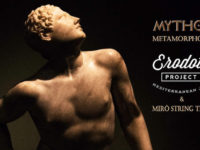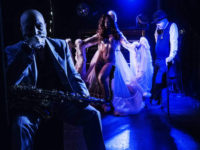Erodoto Project was born in 2016 thanks to the meeting of saxophone player Bob Salmieri and keyboard player Alessandro de Angelis. An intense collaboration quickly led to their debut: Stories, Lands, Men & Gods was issued in 2017 via Cultural Bridge, a small Italian record label producing mainly jazz and world music. Now, they’ve unveiled a second album, Molon Labe.
The recording contains original songs, and songs from the Mediterranean folk tradition, revisited in Erodoto Project’s personal style. They have as a theme travel and migration. Songs such as “Amara Terra Mia,” made famous by Domenico Modugno; or the poignant “Tinni Vai” by Rosa Balistreri are given new treatments that make them even more current. In that way, Erodoto Project finds new protagonists in migrants crossing the Mediterranean in our time, witnesses to the endless epic of migration. In the jazz of this quintet are tales but also other tales: Those of the myths of the Mediterranean, the Middle East and Sicily.
This Rome-based band is named after Erodoto (the Italian translation of Herodotus), who was considered the first “reporter” in history. He was a keen observer of ancient times, thanks to a curiosity in trying to understand the civilized world. This curiosity prompted him to travel and see with his own eyes what was happening in the world or to collect validated testimonies if he could not travel in person. His stories and chronicles of war have been passed down the centuries and the band have taken Herodotus’s travels as the basis for their curiosity about the people encountered during his travels.
The title track opens Molon Labe and is a strong, swingy number with gorgeous, sensual Latin-esque overtones and a rich, rhythmic gait right the way through. Melodic sax sings across a solid rhythm section. There is a change of pace in the second third, with a keyboard-led section before the sax leads again and the piece sashays its way towards the drum solo, before continuing to its resolution.
“Gods of Sicily” is atmospheric, spacey and after a keyboard-led intro, the sax sets the gentle theme, with the swaying rhythms of the ocean prevailing underneath, combining the softness of the Rhodes with the percussive, rhythmic and Marco Loddo’s heavy bass line which the sax soars over. “Blues for Tony Scott” is gentle, with breathy, reedy tenor over soft, whimsical support. The style is in that of the great clarinetist to whom the track is a tribute. There is a lovely piano section from Alessandro de Angelis. The sax, is gentle and respectful, with a deep, sonorous bass line in support.
“Leonida” is introduced by de Angelis’s piano before Bob Salmieri adds a light, textured and atmospheric theme on a ney flute. The piano then takes the lead once again, with the ney twinkling and sparkling across the top. Those breathy slurs up to the notes are so typical of Eastern sounds, and the atmosphere is distinctly far Mediterranean. Loddo’s bass solo sets a change before the ney and piano work their magic once again in support. “Silent Mammouth” is anything but silent with deep, beautiful sax over a sultry, sexy samba with a burgeoning excitement bubbling underneath. This is an engaging track and drenched with atmosphere.
“Dervish Dream” is eerily evocative, beginning as it does with a slowed-down Latin rhythm and percussive sounds (all gentle and subtle) of beads, cords and coins – maybe a market place? The piece builds with the sax entering and thematically taking us on a different journey, away from the market, now soaring yet still within earshot of the bells and whistles heard before. A delight of a track and dripping with atmosphere. The highlight of the music is Alessandro de Angelis’s piano solo which hits at the peak of ascension. The track then slowly, gently, lays the listener back to rest, the sax singing us of the dreams. Lovely.
“Gitani di Camargue” is precocious in its theme and tempo changes, including some clapping, the resonance of the daf drum and de Angelis’s gorgeous piano lines. “Latino” is, well, Latin in style and delivered with a lot of fire, some amazing rhythms and a swinging feel.
“Big Father” is heralded by sax before piano joins and together with Marco Loddo’s bass underpinning, they set off on a groove which is deep and emotive. The sax rises, soars and ebbs with a sweetness and emotion which is engaging and Alessandro de Angelis’s piano section is trinkly, pretty and works its way up to a crescendo of deftly delivered melody. The sax then drops and leads to a gentle piano-led section featuring bass underpinning with steady and inventive lines. “Instanbul Bossa” closes out Erodoto Project’s Molon Labe, and is lively. The rhythms are set by Giampaolo Scatozza’s drums and picked up by the Loddo’s bass, then quickly everyone follows. A great track to finish the album.
There is a marriage about Molon Labe, the marriage of jazz, Eastern and Latin sounds – but with a twist which makes it individual. The deep thrum of the daf and the light notes formed by the ney are used to introduce sounds which are redolent of specific musics but which also lend themselves to this mix of cultures. The strength of the sax playing is phenomenal, but there are also stellar solo spots and stolid support work from the rest of the band. Enjoyable, well-honed and expertly delivered, this is a really engaging recording.
- Wabi Sabi – ‘The Love Insane’ (2024) - March 24, 2024
- James McGowan Ensemble – ‘Reaching In’ (2023) - December 10, 2023
- Defne Sahin – ‘Hope’ (2023) - November 19, 2023




